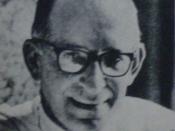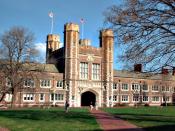Jessie Shirley Bernard, was a prominent and "unusually visible" contemporary American sociologist who over her professional lifetime changed from a traditional positivist sociology to a feministically informed viewpoint (Bannister 1991). Privately, Bernard struggled with her Judaic heritage, conflicting pressures for family and career and the demands made by Bernard's husband. All of the battles that Bernard faced throughout her life, were essential in the creation of Bernard's sociological theories.
Bernard was born in Minnesota on June 8, 1903 to Roman Jewish parents who had recently immigrated to the United States. With an entrepreneurial "capitalist" father and a stay at home mother, Bernard was raised in a suburban, middle-class family (Bernard 1989,326). Upon entering high school in 1916, Bernard was taught by suffragist teachers, who subtly transmitted a feminist message during class lectures (Bernard, 1989, 325). As a 2nd generation immigrant during a time when immigration was a major concern to white Americans, Bernard, although a United States citizen, felt torn and confused about her place in society.
Occasionally mocked for her Romanian and Jewish background, Bernard understood for the first time the situation of the two black families in her town. Further, Bernard was exposed to her older sister's radical socialist friends and their persuasive arguments and beliefs. Conscious of the controversial issues surrounding her, Bernard began her lifelong investigation of injustice of all kinds, most notably racism and sexism.
When Bernard was only 16 years old, in 1920, she enrolled at the University of Minnesota initially as an English major (Deegan 1991, 71). Following one recommended Sociology course, Bernard fell in love with the discipline. Bernard declares, "[i]t is not surprising to me now that a young woman with a background like mine, would, with a little encouragement, become a sociologist" (Bernard 1989, 325).
In 1925, one year...


